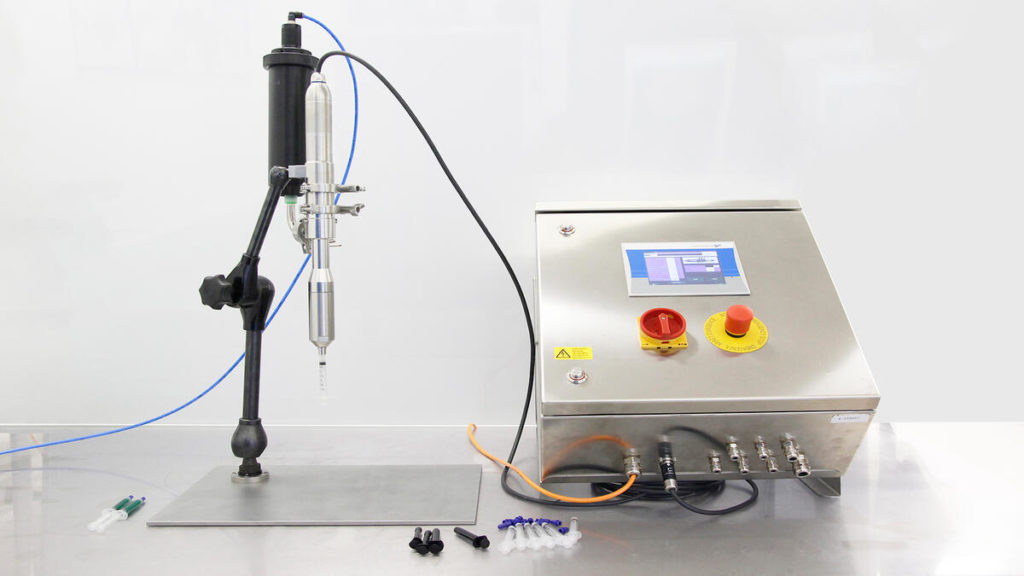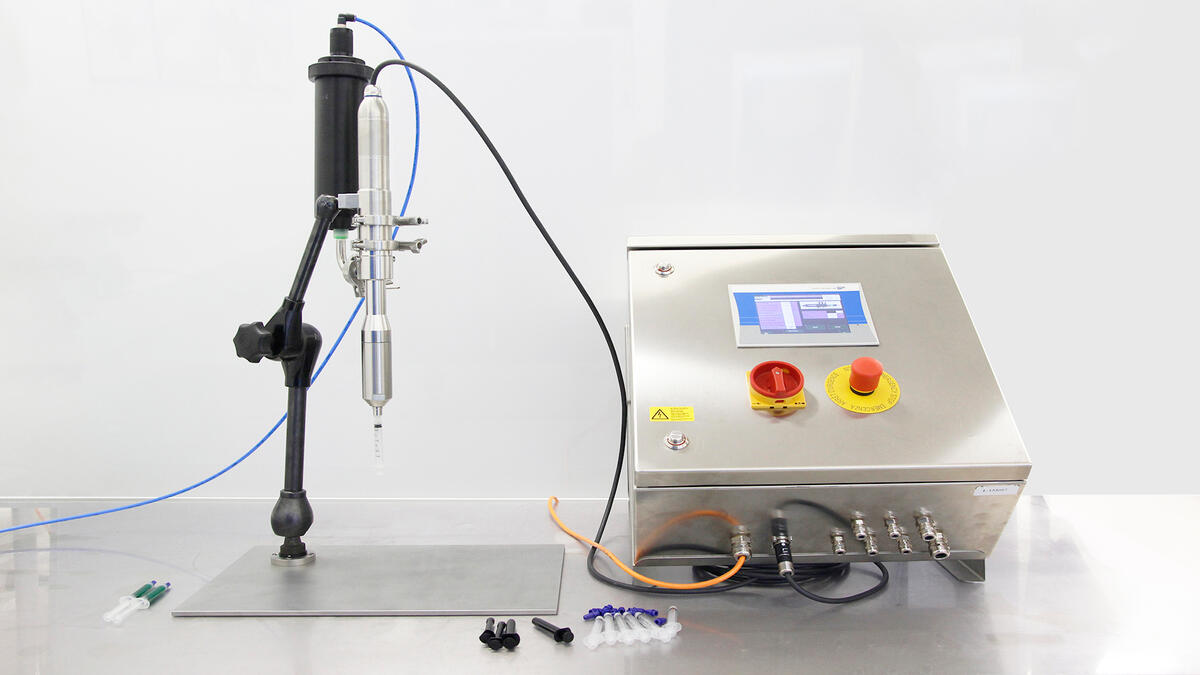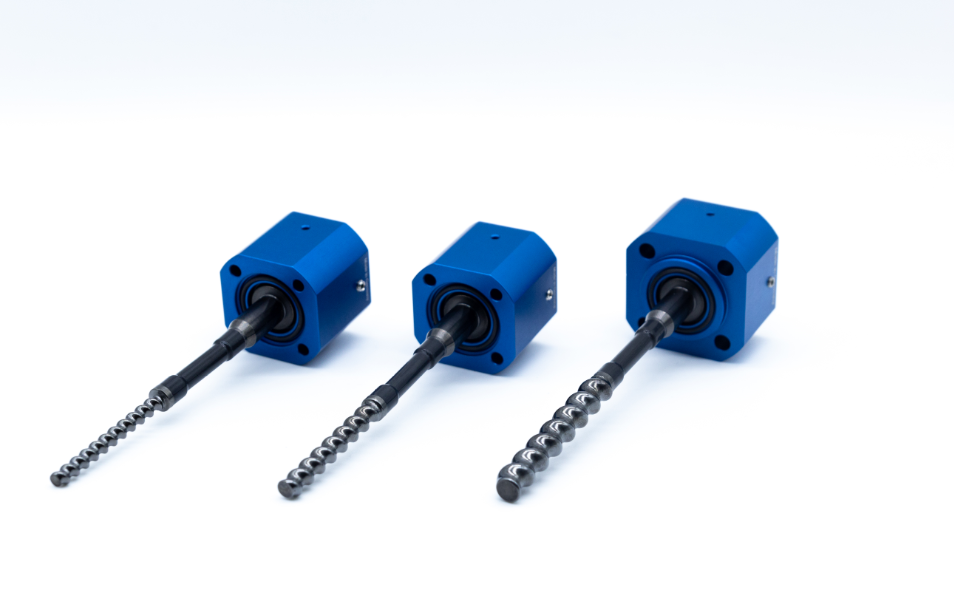Filling Composites in the Dental Industry
Semi and fully automatic processes save time and material
In the dental industry, consumables such as composites are filled into disposable syringes with Luer Lock attachment or into smaller Unit Dose packages. These flowable filling materials made of plastic and glass are usually highly abrasive, highly viscous, and stringy. This places high demands on dosing and filling systems. The materials are used in the dental industry, for example, for sealing, restorations, or core build-up.
The filling of syringes is often done manually until now and is therefore very time-consuming. Semi and fully automatic filling systems provide a solution to this. The endless piston principle used in the ViscoTec dispensers impresses with its gentle, high-precision material handling. It guarantees repeatable processing of low to high viscosity materials. The material is dosed volumetrically, so that even larger particles can be transported without getting damaged. The size of the alternating opening chambers is also constant during rotation, so that no compression of the dosed product occurs. This is an important aspect for the shear-sensitive fillers in the composites. Even abrasive fillers such as ceramics or glass can be reliably dosed with the endless piston technology thanks to the hard chrome-coated rotor.

Composites are available in many different colors. They must therefore be easy and flexible to fill, even in small batches. Hygienic dispensers such as those from ViscoTec are designed precisely for these purposes. They are easy to clean. The high-performance materials used are highly resistant to chemicals and enable cleaning with strong solvents after simple, tool-free disassembly, either manually or in automatic cleaning machines. The dispensers meet the highest cleaning and hygiene standards and have an EHEDG certificate (European Hygienic Engineering and Design Group). The elastomers used are FDA-compliant. The documentation is completed by a 3.1 factory certificate according to DIN-EN 10204 for metallic components. To protect the materials against harmful environmental influences and to protect the environment against unplanned product leakage, the seal housing, which was specially developed for the pharmaceutical industry, is equipped with a barrier chamber (quench). The Hygienic Dispenser series has been specially developed for applications in the pharmaceutical, medical technology and cosmetic product sectors.
Volumetric dosing or filling achieves perfect dosing results even with the smallest filling quantities from 0.1 ml. A constant thread break thanks to programmable suck-back guarantees an absolute repeat accuracy of >99 % – an important aspect in handling the often stringy materials. There is no contamination of the packaging or the dosing needle.
Filling composites: Semi-automatic processes
The semi-automatic benchtop solution offers time savings and safe handling for the user. This variant is perfectly suited for small batches, which are e.g. necessary e.g. in the context of developments or for rare colors. It is possible to achieve a net dosing time of less than 1 second per 1 ml, depending on the viscosity of the material.
Operation is very simple: For filling, the user screws the syringe to the system via the Luer Lock attachment and the dosing is started by activating the foot switch. Power supply and compressed air are sufficient on site for the installation. The supplying takes place via a cartridge system which is available in various sizes up to a maximum of 950 ml.
The associated control unit enables simple but exact control of the flow rate and desired dosing volume. By direct input via the touch panel, dosing volume, dosing speed, calibration, and retraction at the dosing end (reversal of the direction of rotation of the dispenser) can be set and controlled in a process-safe way.
Filling composites: Fully automatic processes
The hygienic dispensers have proven themselves in fully automatic systems for series production. The dispenser drive controllers can be easily integrated into a higher-level control system via various interfaces, such as Profinet. Space-saving arrangements of the compact dispensers can be realized via V-arrangements or block pump housings.
The syringes or Unit Dose components can be transported to the dosing end of the Hygienic Dispenser either with conventional conveyor technology or with robots. The syringes are filled by pressing the Luer side against the dispenser. The Unit Dose packages are filled on the stopper side via mirror filling – and allow even smaller quantities to be filled. Due to their minimal opening, the material can be applied even more precisely. They are used, for example, to seal fissures or repair fillings or small fillings in the cervical area, in order to avoid wasting high-priced composites.
Product and cost savings with the right filling technology
Due to the special dosing geometry, a constant volume is always conveyed per revolution in proportion to the angle of rotation – independent of the viscosity of the material and with pulsation-free product flow. Even at dosing pressures of up to 20 bar, when handling highly viscous materials such as composites, the dosing result remains linear to the number of pump revolutions – even when using materials with viscosities up to 7 million mPas. The pump technology of the endless piston principle has additional advantages over other dosing mechanisms. For example, filling and dosing valves can be completely dispensed with in over 95 % of all applications. A programmable suck-back results in a controlled thread break and dripping is prevented. Thanks to the high-precision filling, the usual overfilling is no longer necessary. This saves valuable material and therefore reduces cost.
The filling process is shown in the video:
Categories
- Animals (1)
- Design (5)
- Dispensers (38)
- Dopag (8)
- Events (3)
- Markets (1)
- Meter Mix (8)
- Music (1)
- News (4)
- Precifluid (4)
- Preeflow (35)
- Travel (4)
- Uncategorized (9)
- Viscotec (40)



